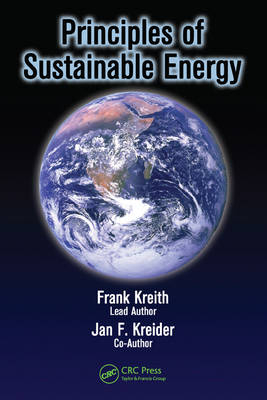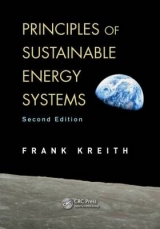
Principles of Sustainable Energy
Crc Press Inc (Verlag)
978-1-4398-1407-9 (ISBN)
- Titel erscheint in neuer Auflage
- Artikel merken
A transition from a fossil fuel–based economy to one that uses renewable energy has become inevitable; this transition will not only be an engineering challenge, but will also be an economic and environmental one. Offering an interdisciplinary, quantitative approach, Principles of Sustainable Energy presents a comprehensive overview of the major renewable energy technologies currently available, including biomass and biofuels, solar thermal conversion, photovoltaics, and wind energy conversion.
Written by renowned expert Frank Kreith, the book emphasizes economics as well as energy return on investment analyses for each technology and integrates the need for energy conservation with the overall aspects of building a sustainable energy system with renewable sources. The author covers energy storage in depth, because it is considered one of the most important, and problematic, requirements for building a sustainable renewable energy system. Treatments of the economics of nuclear power and options for transportation systems are also included.
The book contains worked-out example problems illustrating engineering analyses from a systems perspective and problem sets to reinforce concepts and applications. Examples and exercises relating to solar energy systems cover latitudes in the Northern and Southern Hemispheres and use current worldwide solar radiation data. But this text is not merely academic: its clearheaded look at the energy picture from the ground up, and the environmental, economic, and sustainability benefits that renewable energy systems can provide, make it a resource for government and industry as well as a text for engineering students.
Frank Kreith is the ASME Legislative Fellow for Energy and Environment at the National Conference of State Legislators. Jan F. Kreider is the Founding Director of the University of Colorado's Joint Center for Energy Management.
Introduction to Sustainable Energy
Global Sustainability
Role of Energy Conservation
Nuclear Energy
Hydrogen
Geothermal Energy
Global Status and Potential of Renewable Energy
Summary of Renewable Energy Resources
Orders of Magnitude
Energy Units and Conversion Factors
Problems
Online Resources
References
Suggested Readings
Economics of Energy Generation and Conservation Systems
Time Value of Money
Inflation
Societal Costs
Total Life Cycle Costs
Internal Rate of Return
Levelized Cost of Energy
Example of a Typical Cash Flow Scenario
Energy Analysis Methodology
EROI for a Wind Energy System
EROI for Nuclear Power
Problems
Appendix 2.A Capital Recovery Factor
References
Wind Energy, Contributing Author: G. Pawlas
Wind Power in a Nutshell
Power and Energy
Fact or Fiction: Common Questions about Wind Turbines
History of Wind Turbine Development: HAWTs and VAWTs
Introduction to Wind Turbine Performance
Aerodynamics
Wind Characteristics
Turbine Performance
Cost of Energy
Wind Farms
Offshore Wind Energy
Additional Topics for Study
Acknowledgment
Problems
References
Capturing Solar Energy through Biomass, Contributing Authors: R.C. Brown and M.M. Wright
Introduction
Biomass Feedstocks
Conversion of Biomass to Gaseous Fuels
Transportation Fuels from Biomass
Conversion of Biomass to Electricity
Conclusions
Solutions to Selected Problems
Additional Problems
References
Fundamentals of Solar Radiation
The Physics of the Sun and Its Energy Transport
Thermal Radiation Fundamentals
Sun–Earth Geometric Relationship
Solar Radiation
Models Based on Long-Term Measured Horizontal Solar Radiation
Measurement of Solar Radiation
Problems
Appendix
References
Photovoltaics
Semiconductors
Analysis of Photovoltaic Cells
Manufacture of Solar Cells and Panels
Design for Remote Photovoltaic Applications
Thin-Film PV Technology
Multilayer PV Technology
Problems
References
Solar Heating and Cooling of Buildings
Radiative Properties and Characteristics of Materials
Flat-Plate Collectors
Evacuated Tube Collectors
Experimental Testing of Collectors
Calculations of Heating and Hot Water Loads in Buildings
Solar Water-Heating Systems
Liquid-Based Solar-Heating Systems for Buildings
Methods of Modeling and Design of Solar Heating Systems
Solar Cooling
Solar Desiccant Dehumidification
Problems
Appendix
References
Solar Process Heat and Thermal Power
Historical Perspective
Solar Industrial Process Heat
Parabolic Collectors
Long-Term Performance of SIPH Systems
TRNSYS—Computer Simulation Program
Solar Thermal Power
Examples of Solar Thermal Power Plants
Parabolic Dish Systems and Stirling Engines
Recent Developments in Solar Thermal Power Cycles
Problems
References
Passive Solar Heating, Cooling, and Daylighting, Contributing Author: J.H. Morehouse
Introduction
Solar Thermosyphon Water Heating
Passive Solar Heating Design Fundamentals
Passive Space Cooling Design Fundamentals
Daylighting Design Fundamentals
Defining Terms
References
For Further Information
Energy Storage
Overview of Storage Technology
Mechanical Technologies
Direct Electrical Technologies
Fundamentals of Batteries and Fuel Cells
Rechargeable Batteries
Fuel Cells and Hydrogen
Thermal Energy Storage
Problems
References
Other Battery Resources
Ocean Energy Conversion
Ocean Thermal Energy Conversion
Tidal Energy
Ocean Wave Energy
References
Transportation
Introduction
Alternative Fuels
Well-to-Wheel Analysis
Mass Transportation
Hybrid Electric Vehicles
Plug-In Hybrid Electric Vehicles
Advanced Ground Transportation with Biomass Fuel
Future All-Electric System
Hydrogen for Transportation
Problems
References
Index
| Erscheint lt. Verlag | 7.1.2011 |
|---|---|
| Reihe/Serie | Mechanical and Aerospace Engineering Series |
| Zusatzinfo | 16 pg color insert to follow page 424; 650-750 equations; 115 Tables, black and white; 365 Illustrations, black and white |
| Verlagsort | Bosa Roca |
| Sprache | englisch |
| Maße | 156 x 234 mm |
| Gewicht | 1383 g |
| Themenwelt | Technik ► Elektrotechnik / Energietechnik |
| ISBN-10 | 1-4398-1407-4 / 1439814074 |
| ISBN-13 | 978-1-4398-1407-9 / 9781439814079 |
| Zustand | Neuware |
| Haben Sie eine Frage zum Produkt? |
aus dem Bereich



